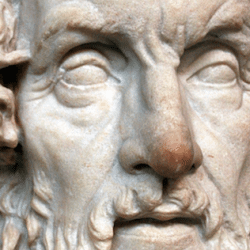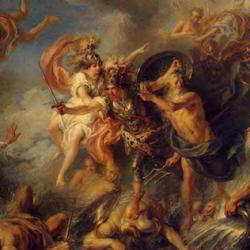The Iliad was the virtual Bible of the Greek world. As Plato says in the Republic, some Greeks (not Plato!) believed that Homer “educated Hellas and that he deserves to be taken up as an instructor in the management and culture of human affairs, and that a man ought to regulate the whole of his life by following this poet.”
The popularity of Homer can be gauged by the number of copies or fragments of his poems that have been found. By 1963, nearly 1600 books with identifiable authors had been catalogued from the papyri in Egypt. Nearly ½ were copies of Iliad or Odyssey, and the Iliad outnumbered the Odyssey 3:1. Plato is represented by 42 manuscripts, Aristotle by 8. Though these texts were copied after Alexander, but they appear to be representative of Greek culture generally (from MI Finley, World of the Odyssey).
Homer and particularly Achilles was held up as a standard for moral heroism by both Socrates and Aristotle. In the Apology, Socrates answers a questioner who thinks he should be ashamed of his untimely end with a reference to Achilles: “There you are mistaken: a man who is good for anything ought not to calculate the chance of living or dying; he ought only to consider whether in doing anything he is doing right or wrong – acting the part of a good man or of a bad. Whereas, according to your view, the heroes who fell at Troy were not good for much, and the son of Thetis above all, who altogether despised danger in comparison with disgrace; and when his goddess mother said to him, in his eagerness to slay Hector, that if he avenged his companion Patroclus, and slew Hector, he would die himself – ‘Fate,’ as she said,’waits upon you next after Hector’; he, hearing this, utterly despised danger and death, and instead of fearing them, feared rather to live in dishonor, and not to avenge his friend. ‘Let me die next,’ he replies, ‘and be avenged of my enemy, rather than abide here by the beaked ships,a scorn and a burden of the earth.’ Had Achilles any thought of death and danger? For wherever a man’s place is, whether the place which he has chosenor that in which he has been placed by a commander, there he ought to remainin the hour of danger; he should not think of death or of anything, butof disgrace. And this, O men of Athens, is a true saying.”
In Posterior Analytics, Aristotle addresses the question of what two similar individuals have in common when they possess the same quality in different ways. He points out that magnanimity can take two forms: “If we were inquiring what the essential nature of pride is,we should examine instances of proud men we know of to see what, as such, they have in common; e.g. if Alcibiades was proud, or Achilles and Ajax were proud, we should find on inquiring what they all had in common, that it was intolerance of insult; it was this which drove Alcibiades to war, Achilles wrath, and Ajax to suicide. We should next examine other cases, Lysander, for example, or Socrates, and then if these have in common indifference alike to good and ill fortune, I take these two results and inquire what common element have equanimity amid the vicissitudes of life and impatience of dishonour. If they have none, there will be two genera of pride.”
As Richard Buxton puts it in Imaginary Greece, “Homer was required study: when the fifth-century politician Alkibiades went to a school and was unable to get a text of part of the poet’s work, he left — or so the story ran — after punching the teacher” (p 23). He goes on to explain how Strabo’s exegesis of Homer made it possible for adults to read it seriously by peeling away what was not serious in it. Plutarch too said that Homer taught that “vulgar music, coarse songs, and stories treating of vile themes, create licentious characters, unmanly lives, and men that love luxury, soft living, intimacy with women and ‘changes of clothes, warm beds, and the genial bed of enjoyment” (quoted in Buxton pp 173-4).











